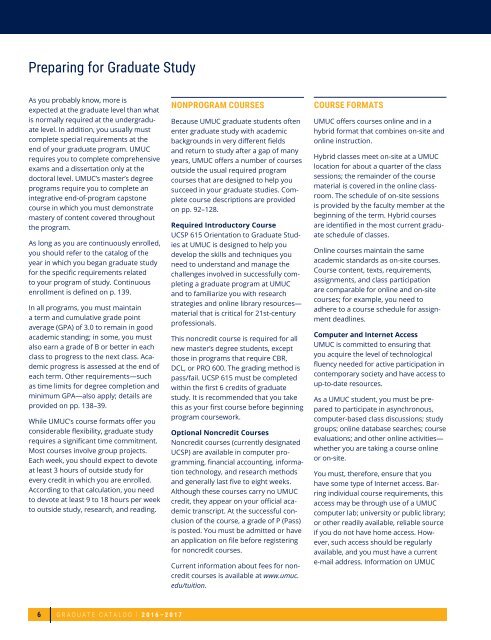2016–2017 2016–2017
2016-2017-graduate-catalog
2016-2017-graduate-catalog
You also want an ePaper? Increase the reach of your titles
YUMPU automatically turns print PDFs into web optimized ePapers that Google loves.
Preparing for Graduate Study<br />
As you probably know, more is<br />
expected at the graduate level than what<br />
is normally required at the undergraduate<br />
level. In addition, you usually must<br />
complete special requirements at the<br />
end of your graduate program. UMUC<br />
requires you to complete comprehensive<br />
exams and a dissertation only at the<br />
doctoral level. UMUC’s master’s degree<br />
programs require you to complete an<br />
integrative end-of-program capstone<br />
course in which you must demonstrate<br />
mastery of content covered throughout<br />
the program.<br />
As long as you are continuously enrolled,<br />
you should refer to the catalog of the<br />
year in which you began graduate study<br />
for the specific requirements related<br />
to your program of study. Continuous<br />
enrollment is defined on p. 139.<br />
In all programs, you must maintain<br />
a term and cumulative grade point<br />
average (GPA) of 3.0 to remain in good<br />
academic standing; in some, you must<br />
also earn a grade of B or better in each<br />
class to progress to the next class. Academic<br />
progress is assessed at the end of<br />
each term. Other requirements—such<br />
as time limits for degree completion and<br />
minimum GPA—also apply; details are<br />
provided on pp. 138–39.<br />
While UMUC’s course formats offer you<br />
considerable flexibility, graduate study<br />
requires a significant time commitment.<br />
Most courses involve group projects.<br />
Each week, you should expect to devote<br />
at least 3 hours of outside study for<br />
every credit in which you are enrolled.<br />
According to that calculation, you need<br />
to devote at least 9 to 18 hours per week<br />
to outside study, research, and reading.<br />
NONPROGRAM COURSES<br />
Because UMUC graduate students often<br />
enter graduate study with academic<br />
backgrounds in very different fields<br />
and return to study after a gap of many<br />
years, UMUC offers a number of courses<br />
outside the usual required program<br />
courses that are designed to help you<br />
succeed in your graduate studies. Complete<br />
course descriptions are provided<br />
on pp. 92–128.<br />
Required Introductory Course<br />
UCSP 615 Orientation to Graduate Studies<br />
at UMUC is designed to help you<br />
develop the skills and techniques you<br />
need to understand and manage the<br />
challenges involved in successfully completing<br />
a graduate program at UMUC<br />
and to familiarize you with research<br />
strategies and online library resources—<br />
material that is critical for 21st-century<br />
professionals.<br />
This noncredit course is required for all<br />
new master’s degree students, except<br />
those in programs that require CBR,<br />
DCL, or PRO 600. The grading method is<br />
pass/fail. UCSP 615 must be completed<br />
within the first 6 credits of graduate<br />
study. It is recommended that you take<br />
this as your first course before beginning<br />
program coursework.<br />
Optional Noncredit Courses<br />
Noncredit courses (currently designated<br />
UCSP) are available in computer programming,<br />
financial accounting, information<br />
technology, and research methods<br />
and generally last five to eight weeks.<br />
Although these courses carry no UMUC<br />
credit, they appear on your official academic<br />
transcript. At the successful conclusion<br />
of the course, a grade of P (Pass)<br />
is posted. You must be admitted or have<br />
an application on file before registering<br />
for noncredit courses.<br />
Current information about fees for noncredit<br />
courses is available at www.umuc.<br />
edu/tuition.<br />
COURSE FORMATS<br />
UMUC offers courses online and in a<br />
hybrid format that combines on-site and<br />
online instruction.<br />
Hybrid classes meet on-site at a UMUC<br />
location for about a quarter of the class<br />
sessions; the remainder of the course<br />
material is covered in the online classroom.<br />
The schedule of on-site sessions<br />
is provided by the faculty member at the<br />
beginning of the term. Hybrid courses<br />
are identified in the most current graduate<br />
schedule of classes.<br />
Online courses maintain the same<br />
academic standards as on-site courses.<br />
Course content, texts, requirements,<br />
assignments, and class participation<br />
are comparable for online and on-site<br />
courses; for example, you need to<br />
adhere to a course schedule for assignment<br />
deadlines.<br />
Computer and Internet Access<br />
UMUC is committed to ensuring that<br />
you acquire the level of technological<br />
fluency needed for active participation in<br />
contemporary society and have access to<br />
up-to-date resources.<br />
As a UMUC student, you must be prepared<br />
to participate in asynchronous,<br />
computer-based class discussions; study<br />
groups; online database searches; course<br />
evaluations; and other online activities—<br />
whether you are taking a course online<br />
or on-site.<br />
You must, therefore, ensure that you<br />
have some type of Internet access. Barring<br />
individual course requirements, this<br />
access may be through use of a UMUC<br />
computer lab; university or public library;<br />
or other readily available, reliable source<br />
if you do not have home access. However,<br />
such access should be regularly<br />
available, and you must have a current<br />
e-mail address. Information on UMUC<br />
6<br />
GRADUATE CATALOG | <strong>2016–2017</strong>


